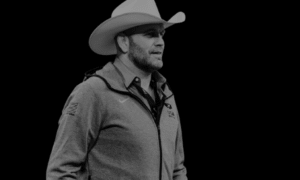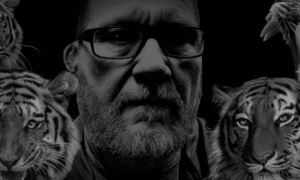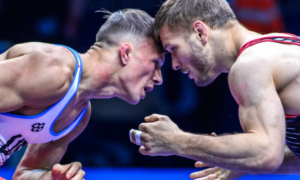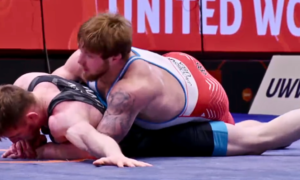Five Point Move is proud to host USA Greco-Roman National Team head coach Matt Lindland each week for Coach Lindland’s Report. Here is where you will find detailed perspectives from Coach Lindland regarding results, training, upcoming events, and other Greco-related news that isn’t available anywhere else. ALSO — if you would like to donate directly to the US Greco-Roman program, just click here. Your support is appreciated!
With four (FOUR!) World Team Trials tournaments scheduled for next month, business is about to pick up in a very big way for the United States Greco-Roman program. But since we’re in the middle of one last breather before all that happens, we tackled some other topics with Coach Lindland this time around. First on the docket is the return of former two-time Junior World Team member and 2015 Senior Trials runner-up Kevin Beazeley (97 kg, Cliff Keen WC), who is competing this coming weekend in Italy. The discussion then moves to collegiate wrestlers and how many of them might be “grinded out” by the time they finish school and begin international careers. We then close out with talk about the freestyle transition camps, Lindland’s recent camp at Northern Michigan, and what has been going on at the Olympic Training Center these days.
5PM: It seems like some others in wrestling media and even some fans tend to expect negativity coming from Greco athletes and coaches. It’s almost as if they are looking for it, in a way. The problem with that is it is counterproductive, right? Aren’t there many more positive things to talk about right now?
Coach Matt Lindland: Well yes, it’s not a fight I want to get into. It’s not a battle I want to waste a ton of energy on. It’s like watching young guys wrestle, they are using so much energy and it’s not productive, Why are you using so much energy? It’s really about using the proper amount of energy at the right times, it’s not about wasting energy. When I talk about guys wrestling, I think the same thing, How do we get the most for the least? How do you use the least amount of energy to get the most results?
My acronym that I created for MMA was Minimize the energy expended, Maximize the most effective systems, and Attack as efficiently as possible. I mean, this is Sun Tzu, this is ancient warfare (laughs). It’s not about getting in Twitter wars and battles that just waste your energy and your time. It’s like, Why do I want to fight that? That acronym doesn’t change for wrestling, it is really what we’re trying to do, we want to score the maximum amount of points. Philosophically, that is how I coach my athletes. A lot of the Senior guys are getting better at this, but a lot of the younger athletes need some practice. To them it’s about “Going hard.” I’m all about going hard and creating a fight, but I can’t do what (Joe) Rau did, put six points up on your opponent and lose the match. He didn’t use his energy efficiently, he really didn’t, and that is a good example of not using one’s energy efficiently.
5PM: Kevin Beazley is returning to Greco-Roman competition this weekend, which is obviously good news for the program. He is a very talented individual and was coming on strong right before the Rio Olympic year.
ML: Yeah, it is. Kevin is a Greco guy, he was on two Junior World Teams, his dad is a Greco coach. But this is the problem with our system in the US. We put so much emphasis on going to the colleges after 12 years of compulsory education in our school systems, and it is the culture that dictates You have to do this. You know, I talk to athletes on a daily basis and every time I talk to them, whether they are freestyle or Greco guys, it’s like, Yeah, I’m going to college… They’re not excited about it, they’re not thrilled. So I’ll ask, Then why are you doing it? And they say, Uh, I don’t know. They can’t explain to you why they’re doing it. Maybe they are doing it to please their parents or because someone told them that the only way to succeed in life is to have this parchment from some prestigious university.
If that is really your passion and you want to get a degree, then I understand. But if you don’t know why you’re doing it, then why the hell are you doing it? Because really, it doesn’t make any sense to me. In sports like gymnastics, when you look at those athletes, if they don’t make it to the Olympics they go to college and wind up competing at that level. But, they’re number-one priority is to get on an Olympic Team if they are an elite athlete. We have a lot of elite athletes in our country who are forgoing the international styles. Look at all of the Penn State wrestlers who didn’t go to the freestyle Trials, they’re not going to show up at the Greco Trials. They are incredible wrestlers, but their focus is not on winning World and Olympic medals, it is on winning NCAA titles. They think there is going to be time after college.
Those days, if not gone already, are going away very quickly. They think you can go through a college program and then by the time they’re out of school, make the necessary adjustments. There are some phenoms. Someone like (Kyle) Snyder has been able to accomplish that while he was in college, but not everyone is Kyle Snyder, either. Look at Henry Cejudo. He went out and got his medal, came back, received his degree, and it was all paid for. Because he was an Olympic champion. So I think there are plenty of opportunities for you to go back and get your education after you accomplish your athletic goals, and they don’t have to go hand-in-hand.
5PM: The one thing I tend to wonder about is aside from the adjustments and technical differences between folkstyle and Greco, Greco is also a much more physical style. That’s undeniable. So to me, I wonder if one of the detriments to competing in college and then moving into Greco is that you’ve already grinded your body down a whole lot by the time you really start as a Senior.
ML: Well, definitely. They are proud of the fact that they grind. They “embrace the grind”, they push the grind. They want to grind themselves out and it is like a badge of honor. And I understand that because I went through that system, but there wasn’t an option to do what athletes can do today, which is get themselves to a training environment and prepare for international competition. For me it was like, Once you get through the college system, then you get recognized by the National coaches and you could move on to Senior wrestling. It was almost like you had to do it this way. That isn’t the case anymore. We’re identifying our athletes at a much younger age. We are identifying Cadets, and sometimes, even Schoolboys, and saying, If you want to do this, this is the route you can go and we can help you get to those goals if you have the proper desire.
But it is definitely hard. We look at guys like Sam Stoll. He tore his knee up twice, two ACL surgeries while he was in college. You’re not getting any knees twisted around in Greco. Sam was a World medalist in the Junior age group. We see it time and time again. Jake Allar is another guy had a major surgery this year from the college system. There are numerous guys, I could come up with a whole list. The leaders understand, they know who those people are who have gone into a college system, got grinded out, because they didn’t embrace it well enough, I guess. Or, their bodies just can’t handle that volume of training for that short period of time.
So I don’t know. It is still a challenge that we as American coaches have no one else in the world has to deal with. The nice thing is we have so many athletes competing, if we can get them to commit to what they want to do and do something that they love, instead of doing something that they have to do. That’s the language that they use, I have to do this. They don’t know why they’re doing it, but they feel like they have to. It’s compulsory. I guess when you’ve been indoctrinated for 12 years by the compulsory school system that we have in the United States, you feel like you have to do this. At that point, you’re an adult and you don’t have to do anything. You can follow your own passion and your own dreams.
I know that there are tons of athletes who will say that this is their preferred style, Oh, I prefer Greco, I prefer freestyle. Most of the elite guys, the best of the best, folkstyle would be their third favorite. They love competing, they love the fight, they love the battle — but they don’t like the philosophy of folkstyle, which is control, control, control, back up. The biggest thing is when I am talking to a guy like Tommy (Dantzler) who made that commitment to be in the Greco program, he didn’t like that guys were stalling on him. They were avoiding wrestling. I love the rule-set now that really doesn’t allow the athletes to avoid wrestling. It forces action. I think the rule-set could bring some guys over, but these young men need to decide what they want to do and follow their own passion and their own dreams, and not follow the trends.
5PM: Part of the directive behind the freestyle to Greco transition camps is not just to steer very good freestylers towards Greco if they got bounced from Final X, but to also hopefully help maybe a few of these wrestlers realize that they were Greco guys all along, it’s just that they were in the wrong style. Is that an accurate way to describe part of the process behind trying to attract more guys to this sport?
Coach Matt Lindland: I think we see that all the time. I see it day-in and day-out, Man, the way this guy wrestles, the style he wrestles, his explosiveness, his athleticism, his usage of body position, body mechanics, leverage — all lend themselves towards him being a Greco athlete. I look at these guys and it is like they are square pegs trying to fit into a round hole.
The other thing I hear is that, Oh, there aren’t a lot of opportunities to wrestle if I don’t do folkstyle. There are opportunities to wrestle, it’s just that many of them happen to be in Europe at that time of the year, in the fall and winter.
Coach (Gary) Mayabb told me he was talking to some athletes at one of the camps and that they are going to some dual tournament in Virginia Beach. I was like, Ahhh, I’m not sure what you’re talking about exactly. What event are we discussing? I was so confused. He said, “Oh, it’s some folkstyle event.” One of the athletes going is a Greco guy, he is on one of our Teams. Why is he going to a folkstyle tournament in the middle of the summer? I don’t understand. Who is guiding these guys, who is helping them? Or is it just selfish coaches who want to win some insignificant event in the middle of the summer? I have no idea why these guys are making those decisions without any consultation from the National staff. That I just don’t understand.
5PM: When it comes to the Seniors, what do you like their training phase to look like a month away from the World Team Trials?
ML: I think their technique needs to be focused on what they are already good at, not adding a bunch of new things to their wrestling repertoires at this time. I think they need to focus on getting to their best positions and figuring out the one or two ways they are going to score from those positions. Option A, I’m going to do that; if he does this, Option B. Then of course, getting their live go’s in and then starting to back off and taper. They don’t need to be long, they can be shorter practices at this time. They need to get their heart rates up and battle it out. It’s definitely a balance between getting enough to where they feel conditioned and confident without overdoing it. That is what the art of coaching is, finding out who needs more and who needs a little less. But as far as technical stuff, I don’t think this is the time of the year to add anything new to what you’re doing. This is the time to focus on your strengths and really fine-tune those things.
5PM: Would you say that is specific to this level?
ML: I wouldn’t say just for the Senior level. Juniors, they have skills. When I was helping out at Clackamas Community College, I had seven athletes who wanted to commit to Greco when it was the Nationals and World Team Trials combined. They wanted an opportunity to get on a World Team, or to give it a shot at least. I told them they had ten days off after the college season and to just rest. If they needed to do something, then they could just lift on their own or run to stay physically fit — but not train. After that, I was bringing them back for a six-week training cycle ahead of the Juniors.
At the end of the camp, literally the last day, one of the athletes came up to me and said, “Coach, you didn’t show us any moves.” I said to this guy, “I spent the last six weeks getting your bodies in the right position to hit the moves you already know.” This is what we did. We focused on their positioning, their mechanics, and trying to get their opponents out of position. Within that, they were hitting plenty of moves when they were training. But it’s not a seminar, it’s a training cycle.
5PM: You were up at NMU for a camp a couple of weeks ago. How did you like working with the Northern athletes and what was your biggest takeaway from your time in Marquette?
ML: My general takeaway is that we’ve got great coaching and leadership in that room. We have some incredible athletes who are really raising their levels to a new standard, and I think that is definitely because we have great leaders up there, and not just on the coaching staff. We’ve got some young men who are really quality people at Northern who have put themselves in leadership positions and are kind of guiding that program. Guys like Dalton (Roberts) and Austin Morrow are really stepping up and doing the right stuff. That is raising everyone’s level and is good for the entire program.
As far as how the trip went, it is always an honor and a privilege to work with those guys. But it (Marquette) is definitely not easy to get to. My flight was delayed out of Colorado Springs. There is one flight connecting from Chicago to Marquette, and by the time they told me I wasn’t going to make that connection, I ended up just going back to my house and staying the night there instead of going to Chicago, where there were air and weather problems.
Getting there is the only slight negative. It is a small community and a small town and hard to fly into. But you see that the guys from Wisconsin, Minnesota, and Illinois have no problem getting there. When we did our camp there a few years ago, we drove from Chicago because it was no problem. So if you live within a five, six-hour radius, it’s not a big deal to just make the drive. I think that is the only negative about that program, it’s hard to fly into. But we’re an impatient society, we want everything right away. I can order on Amazon and it’ll be here tomorrow. I can get on a plane in the morning and get somewhere by the afternoon. When those things don’t work out, we tend to get frustrated, but really, it’s not that big of a deal.
We had some great guys up there I was able to spend some one-on-one time with. On the last day, Andy (Bisek) and I ran the first session. He had actually given the guys the rest of the day off but I didn’t fly out until the next morning so I just said, Hey, I am going to be here in the afternoon if you guys want to come. We had quite a few guys come in and ask questions, we got going about one topic, how to create proper pressure on top from par terre. I think you saw the video I shared of that. It was just like, Hey, I’m discovering something, let’s record this. The guys really started to make some good adjustments and figured out some pressure for their par terre offense, so we all had a good time.
I think it’s beautiful up there. The cuisine in that town, for as small as it is, is better than Colorado Springs. I am not kidding. There just aren’t many franchises, everything is home-cooked, it’s an outdoorsy town, and a small, nice setting. The coffee shops are really cool and fun to go into. I get to order walleye, which I don’t get to do out west. There are some really great restaurants, three or four breweries, and I got to hang out with Andy. That’s how we got on the topic of, Why don’t you come on my leadership show next week? He had some issues he wanted to discuss about leadership.
I love Marquette, it’s just inconvenient so I don’t do it a lot but I need to make a better effort because I love the guys, I love the program, and I think their community is outstanding.
5PM: The Olympic Training Center has added some fresh blood this year with guys like Blake Smith and Easton Hargrave, plus several others. What has been happening down there recently?
Coach Matt Lindland: We have had some quality guys moving out here. Blake was on our U23 (World) Team with (Alex) Sancho. Easton Hargrave has been a great addition, he’s a good example. Easton is a great leader, really. He has strong leadership qualities himself. But not just that, now that the high school season is over, we’ve got guys from Pueblo driving 40 minutes, guys from North Denver making the hour drive, and Cohlton (Schultz) is down in the room everyday from Parker. We’ve got kind of this big metropolitan area where young athletes are driving in here. On top of that, some of the high school kids we worked with when they were younger have now matriculated into college programs and they still have a passion for Greco and want to train between their folkstyle seasons. They may be looking at it like, How can Greco help folkstyle?, but we still want them in the room because they are quality people.
We’ve got some college athletes out here, some young guys from around the community. And since the World Team Trials are coming up for the Cadets and Juniors, we’ve got some guys calling up and asking, Can I get a room out there? Can I get a bed, can I come train? This week, we’ve got three guys who won the Junior Nationals — Tyler Dow, Austin Harris, and Barrett Hughes. They are trying to raise their levels, get into better positions, and hopefully, they are all trying to make the Team. They are great competitors and good athletes, so if they are going to make the Team, we want them to have some good skills and some good basics for when they are headed to the World Championships.
So, it is busy. We went from being a small resident program to having 30 guys in the room during the afternoon practices. I think that’ll extend to morning practices next week when all of the high school athletes are actually out of school.
Be sure to follow Coach Matt Lindland on Facebook, Twitter, and his official blog for updates on the US Greco-Roman Wrestling program.
SUBSCRIBE TO THE FIVE POINT MOVE PODCAST
iTunes | Stitcher | Spreaker | Google Play Music | RSS


















